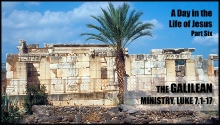
His sermon over, Jesus left the plains and entered Capernaum, a city on the northwest shore of the Sea of Galilee and a major trade center for the region. This is still the same day that Jesus chose the disciples, which occurred after staying up all night in prayer over that decision. He had to be tired, even so there was work to do. Following his teaching he set about proving his message was from God by performing Messianic signs. Luke records these two miracles, a healing and raising someone from the dead, in greater detail than the other Gospel writers.
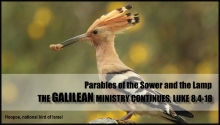
Following the disclosure of women assisting in Jesus’ ministry, Luke records a familiar parable about a farmer sowing seed. We’ve mentioned before four types of people who show up to hear Jesus preach (the 12, other disciples, people needing healing or who want to witness miracles, and the religious authorities); in this parable Jesus tells us four responses people have to his teaching about the kingdom and his right to rule. But this message, while spoken before everyone, isn’t for everyone to understand. Such is the nature, and purpose, of parables.
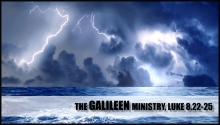
How many great stories involve danger on the high seas? Noah’s Flood, Jonah, The Old Man and the Sea, A Perfect Storm? There is something greatly terrifying about being stranded in any great body of water. The account found in Luke chapter eight wouldn’t make the list, which is too bad as it has more to teach us than any of the others. So our story begins: On one occasion Jesus and his disciples decided to sail across the Sea of Galilee to the Gerasenes region. Along the way a great storm came up…
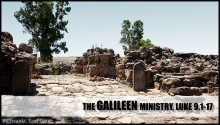
To assure the disciples were learning all that he was teaching, Jesus sent the 12 on a Field Trip. Just as Jesus proclaimed his message through both word and deed, so to ought the disciples. To meet this requirement Jesus passed along his authority over demons and disease to the disciples so that they were empowered to share in his work. Aside from this new authority they were to take only the clothes on their back. All who welcomed them were to be blessed, and all who didn’t were to be treated as Gentiles – those who had not part in the kingdom.
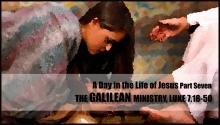
As the day was getting on and the sun low in the sky, the disciples of John the Baptist (who was in prison at the time) came to Jesus to ask a question for their teacher. They wanted to know if Jesus was in fact the Messiah, or if the Messiah were yet to come. Their question was quite direct, yet Jesus didn’t answer their question likewise, answering instead in a cryptic manner leading some (myself included) to believe Jesus may have been communicating more than the answer to their question. Was Jesus speaking in code?

Back in June we looked at two legal cases that were supposed injustices and gaining a lot of attention on Facebook and Twitter. We discovered at the time that one of those cases was just indeed, but the other quite the opposite. That later case is the affair of Brock Turner, a 20-year-old college student who was arrested for raping several girls on campus. During the course of trying the case the charges were reduced to three charges of sexual assault. The convictions carried a possible 14 years in prison. He was convicted on all counts but received a six-month sentence, three of which are to be probation.
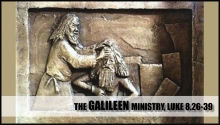
When we last left Jesus and the disciples they were traveling across the Sea of Galilee. Here we see they land at a region known as the Gerasenes (also called Gadarenes), opposite the town they had departed from. Luke notes this so the original readers would understand that this region was a gentile territory, not Jewish. The “town” Luke references without naming is likely Sennabris, located near the coast and home to herdsmen of many kinds, including pigs.

Last time I mentioned that following the Feeding of the 5,000 the disciples became convinced that Jesus was the Messiah they’ve been waiting for. This is evident from the very next story Luke relates to us. While the events we discuss today do not take place on the same day as the miraculous feeding, its placement is not accidental. Yet we’re getting ahead of ourselves; we should start at the beginning. On this occasion Jesus was praying by himself, something Luke often makes mention of, and afterward he called the disciples together to ask them an important question.
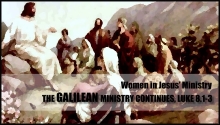
Luke takes a time-out to celebrate the benefactors of Jesus’ ministry, people whom many may be surprised to hear of. While Jesus traveled throughout Galilee with the 12 disciples, they were financed by a group of women, some known to us and some not. It specifically states these women provided for Jesus and his men out of their own means. This made me pause, as I’d always heard from the pulpit that women in first century Israel were oppressed and treated as property. Where did this idea come from? Certainly not from the pages of the Bible!
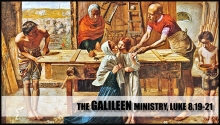
While teaching at an unknown location Mary and some of Jesus’ brothers came to see Jesus. They had difficulty getting through the masses so they sent word of their presence through the crowd. When word reaches Jesus that his family is waiting to see him, he responds in a way many consider cavalier and unkind. “My mother and my brothers,” he replied, “are those who hear the word of God and do it.” Since the gospel writers never tell us what happens after, it appears that perhaps he completely ignored his mother and brother. Does this sound like something Jesus would do?
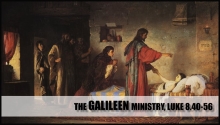
Following his encounter with the scary demoniac of the Gerasenes, Jesus and his band of disciples got back in the boat (which I’m sure is just where they wanted to be, considering the storm they narrowly escaped on the way over) and headed back to the town they left that morning. Apparently he had mentioned to someone that they were taking a day trip and would return that evening, as a large crowd was waiting for him upon his return. Among them was a man named Jarius, an elder at the local synagogue and the father of a very sick 12-year-old girl.
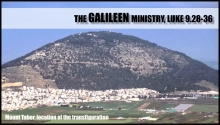
A little over a week after Jesus disclosed his identity to the disciples and warned them of the coming sufferings, he took Peter, James and John up a mountain to pray. Jesus promised his disciples that some of them would not die before seeing the kingdom, and some believe this passage delivers on that promise. The four of them were praying when the appearance of Jesus’ face “transformed”. His face and clothes shone brightly like a flash of lightening. Admittedly it sounds like something from the X-Files more so than the Bible, though there is one other similar reference…
